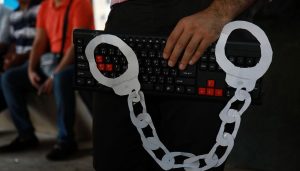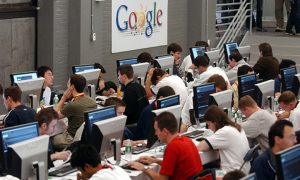This post first appeared on Hibiscus with Ginger on January 29, 2014.
Over the past few weeks, Sudanese activists, both in Sudan and abroad, have launched a campaign to lift US digital sanctions on Sudan. Beginning a few weeks ago, their facebook page states that they hope to:
“introduce the impact of the US sanctions that started in 1997 on the Sudanese society and to start an open conversation with those who are interested in the issue around the world specially from Sudan and US.”
The issue of access to technology in Sudan has been a big one for some time. Helena Puig Larrauri who works with ICT technology and peacebuilding in Sudan, among other places, wrote last year on how sanctions have limited civil society in Sudan, even as the number of groups using technology has grown. One example of this dynamic playing out is Nafeer, a youth initiative that organized to deliver aid to families affected by the flooding in August. While Nafeer used technology in innovative ways, mapping areas affected, they were also hindered by the sanctions, which prevented them from receiving donations from Sudanese people living abroad via their paypal account.
A report from the New America Foundation discusses digital sanctions in greater detail, comparing the ones in place for Sudan to those for other countries, and commenting that while in some ways the regulations are more “basic” they are also less defined. This means that, often, it’s unclear what is permitted or not permitted, making it difficult for companies and websites to decide what users in Sudan should be able to access. For example, one can use and access standard Google products, including Gmail, in Sudan, but Google apps are blocked. The only attempt to reform these restrictions happened in 2010, and implementation has been quite slow.
All of this, of course, has a huge effect on those studying technology in Sudan. As the campaign notes, sanctions interfere with students’ abilities to enroll in online classes, register for international conferences, and train on software used in the rest of the world. For a sense of the extent of this issue, check out this video:
Some activists have voiced concern that these restrictions provide beneficial limitations and that loosening the sanctions will lead to increased abilities on the part of the government, particularly regarding surveillance and mapping software. This concern is merited—it is important to limit knowledge and power in the hands of the government. At the same time, the policy in place is vague and difficult to enforce. If, as many have noted, Sudanese activists have been able to work around sanctions to a certain extent, one can assume that the Sudanese government, with greater monetary resources and roughly the same skill set, has also been able to bypass the sanctions in certain respects.
One thing I have been struck by, watching this discussion play out, is how we are talking about the opportunities of a very limited segment of society. Digital sanctions very clearly limit the abilities and prospects of educated Sudanese youth who are training on outdated software and seeking to compete globally. They also limit the prospects of activist groups who attempt to use technology in new ways to address problems society faces on a daily basis, or who seek funding from the Sudanese diaspora.
It’s less apparent but just as important to note that sanctions limit access to knowledge for those with only very limited use of the internet. The skills that the technologically literate use to bypass digital restrictions are not apparent to the casual user, and many in Sudan use the internet (or specific programs) at a more limited basis than they would otherwise because of restrictions.
I remember going into work the day after google changed its policy regarding apps being accessible in Sudan. For the first few hours, we were unable to access our work email accounts; however, but mid-afternoon, we had all learned how to use VPNs and the day continued as normal. In contrast, plenty of internet cafes that I’ve sat in have an outdated version of Skype, or (more frustratingly) an icon of Skype followed by a dialogue box stating that it could not install properly on the computer.
For someone whose access to the internet comes less regularly, whether because he or she does not own a computer, because the computer is shared, or because he or she accesses the internet primarily on a smart phone, smaller difficulties become more imposing. This means that the casual internet user will be less likely to reach out or gain new skills, exclusively relegating the internet to the role of entertainment. While more and more Sudanese people are using the internet, it is not clear that they can do as much as they’d like on it. How many people attempt to communicate in a certain way or seek out a certain type of information only to give up?
There has to be a way to acknowledge restrictions while making it easier for students, activists, and the average Sudanese citizen to get information. Otherwise, the policy will hinder the government in the short term but will leave the power balance between the state and society the same in the long term, with society falling behind globally in the meanwhile.
*Image from Shutterstock







